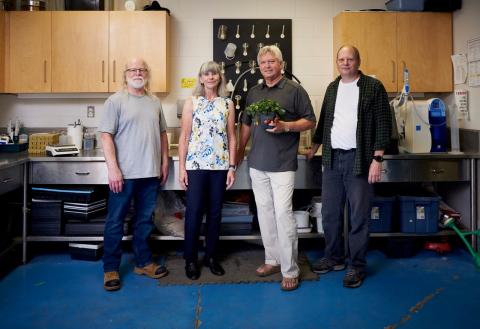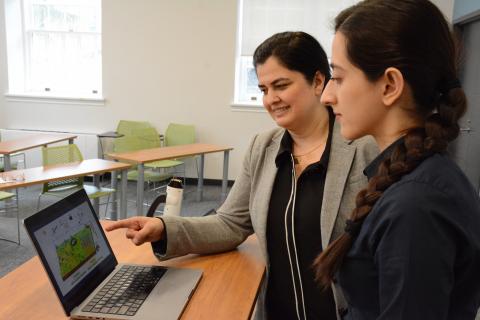- About the Office of Research
- Stategic Research Plan
- Vice-President, Research & Innovation
- Office of Research Units
- Research Centres and Institutes
- Partnership Opportunities
- Student Research Opportunities
- Community Involvement
- Researcher Tools and Resources
- Safeguarding Research
- Commercialization Policy and Framework
- Indigenization, Equity, Diversity and Inclusion in Research
- Research Alerts
- Funding
- Ethics and Regulatory Compliance
- Research Integrity and Conflict of Interest
- Patenting, Licensing, and Commercialization
- Honours and Awards
- Ontario Agri-Food Innovation Alliance
- Other Considerations and Resources
- Forms, Policies, Guidelines, and Procedures
- Interactive Support Sessions for Researchers
- Researcher Training and Development
- Research Administration Information Management System (RAIMS)
U of G Appoints Vice-President (Research and Innovation)

The University of Guelph’s Board of Governors has appointed Dr. Rene Van Acker as its new vice-president (research and innovation) for a five-year term, effective July 1. The announcement was made today by Dr. Charlotte Yates, president and vice-chancellor, who chaired the search committee.
Van Acker has served as the interim vice-president (research) since July 20, 2023, prior to which he was dean of the Ontario Agricultural College (OAC). Starting his academic career as a professor at the University of Manitoba, Van Acker...
Ontario Agri-Tech Pitch Competition 2024

The Research Innovation Office, in partnership with the Government of Ontario, is hosting the Ontario Agri-Tech Pitch Competition to spotlight innovative agri-tech solutions and investible start-ups. Bringing together farmers, researchers, entrepreneurs and investors, the event aims to highlight key challenges in agriculture...
U of G Co-Leads $15M Initiative for Future Pandemics

Dr. Lawrence Goodridge, professor in the Department of Food Science and director of the Canadian Research Institute for Food Safety, is co-leading a $15-million initiative to strengthen Canada’s biomanufacturing sector and pandemic preparedness. The INSPIRE project, co-directed with Dr. Robert McKay of the University of Windsor, will...
U of G Researchers Advance to Phase Two of the Homegrown Innovation Challenge

Two University of Guelph research teams have advanced to phase two of the $33-million Homegrown Innovation Challenge, funded by the Weston Family Foundation. Led by Dr. Mike Dixon and Dr. Youbin Zheng of the School of Environmental Sciences, the teams are developing sustainable, cost-effective methods to extend Canada’s berry-growing season. They are among 11 teams nationwide creating small-...
Innovative Ideas Shine at Project SOY Plus Finale

By Emma Tamburro and Madi Miller-Gouk
The spotlight was on sustainability and innovation at the Project SOY Plus finale, with University of Guelph students showcasing their creative solutions aimed at fostering environmental stewardship.
The competition, known for harnessing student creativity, introduced a new theme this year, the circular economy. Participants were challenged to rethink traditional approaches to production...
U of G Researcher Receives the 2023 Steacie Prize

Dr. Asim Biswas, a soil science professor in the School of Environmental Science, has received the 2023 Steacie Prize, one of Canada’s top awards for researchers under 40. His work focuses on boosting agricultural productivity while promoting sustainability. His team develops data tools, sensors, and soil maps to support smarter farming decisions, helping producers reduce inputs, improve yields, and enhance...
U of G Launches AI Initiative to Benefit Agri-Food Production and Sustainability Practices

Advancing artificial intelligence (AI) research to benefit agri-food systems, along with educational programs that contribute to using these technologies, are the two foundational pillars of a new initiative announced in the College of Engineering and Physical Sciences at the University of Guelph.
Artificial Intelligence for Food (AI4Food) seeks to pioneer research and learning at the intersection of responsible, data-driven technologies and AI in our agricultural and food systems.
...U of G Researcher Stresses Importance of Advanced Monitoring in Water Crisis

By Cate Willis
Urging Canada to bolster its publicly funded monitoring of underground water systems, a University of Guelph researcher recently testified before the House of Commons Standing Committee on Environment and Sustainable Development about the critical need for advanced technologies to safeguard this vital resource.
Dr. Beth Parker, a professor in the ...
Enhancing Research Security at U of G

Photo Credit: Unsplash
By Cate Willis
The University of Guelph is taking a proactive and comprehensive approach to research security by fostering a culture of awareness, diligence and research excellence among its research community while ensuring alignment with evolving regulatory requirements.
In January 2024, the federal government introduced policies to safeguard Canadian research and listed sensitive technology research areas and specific research organizations that researchers should not...
U of G Researchers Receive More Than $ 31.8M in Federal Funding

University of Guelph researchers have received $31.8 million in federal funding to support innovative studies in areas such as microbial communities, cancer therapies, and carbon capture. The funding includes over $13.5 million from NSERC, $4.5 million in scholarships and fellowships, $6.5 million in research support, $4.5 million from the CFI Innovation Fund, $2.5 million from the...
